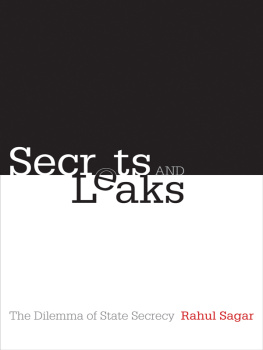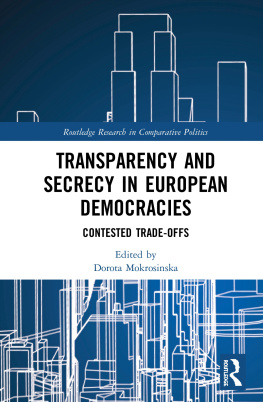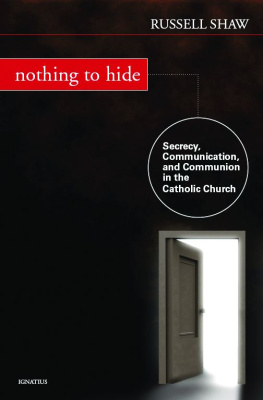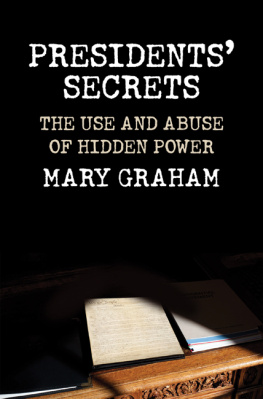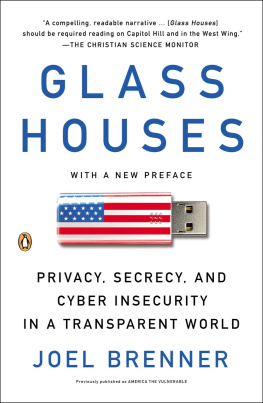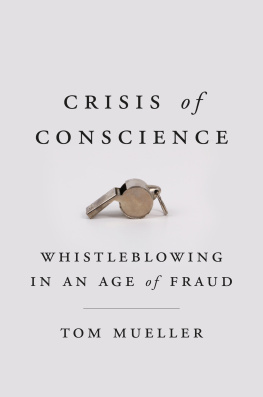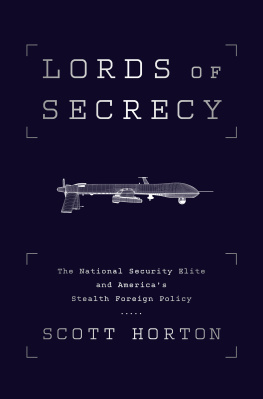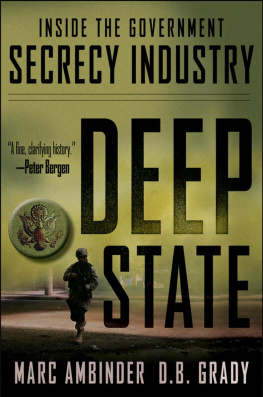
Secrets and Leaks
Secrets and Leaks
The Dilemma of State Secrecy
Rahul Sagar
PRINCETON UNIVERSITY PRESS Princeton and Oxford
Copyright 2013 by Princeton University Press
Published by Princeton University Press, 41 William Street, Princeton, New Jersey 08540
In the United Kingdom: Princeton University Press, 6 Oxford Street, Woodstock, Oxfordshire OX20 1TW
press.princeton.edu
All Rights Reserved
Library of Congress Cataloging-in-Publication Data
Sagar, Rahul.
Secrets and leaks : the dilemma of state secrecy / Rahul Sagar.
pages cm
Includes bibliographical references and index.
ISBN 978-0-691-14987-5 (hardback)
1. Official secrets. 2. Leaks (Disclosure of information) 3. Whistle blowingPolitical aspects. I. Title.
JF1525.S4S48 2013
352.379dc23
2013007163
British Library Cataloging-in-Publication Data is available
This book has been composed in Minion and Glypha
Printed on acid-free paper.
Printed in the United States of America
10 9 8 7 6 5 4 3 2 1
To these great and glorious United States
For in the order of things it is found that one never seeks to avoid one inconvenience without running into another; but prudence consists in knowing how to recognize the qualities of inconveniences, and in picking the less bad as good.
MACHIAVELLI, The Prince, chap. 21
Contents
Acknowledgments
T o write a book is to undertake an arduous trek through a beautiful wilderness; the expedition is exhilarating and excruciating in turns. At the end, one is left with a sense of deep gratitude toward the individuals and institutions that have made the enterprise possible.
In this regard the deepest thanks are owed to my teachers: to Veena Sondhi at Mount St. Marys, who helped me break free; to Stephen Winkley, Martin Priestley, J. D. Shipton, and Peter Cannings who taught me at Uppingham; to James Forder, Sudhir Hazareesingh, David Vines, Andrew Graham, Nandini Gooptu, Stewart Wood, and W.P.S. Sidhu who trained me at Oxford; and to Dennis Thompson, Richard Tuck, Nancy Rosenblum, Pratap Bhanu Mehta, and Devesh Kapur, who guided me at Harvard.
It is no exaggeration to say that studying under Richard and Dennis, who supervised my doctoral education, changed the course of my life. Like so many, I was instantly mesmerized by Richards boundless knowledge and gentle manner. To him I owe a lasting love for history and the constant feeling that I ought to read more. More immediately, I am deeply grateful for his guidance on the research that prompted this book. I was already indebted to Denniss scholarship before I arrived at Harvard. Since then the debts have only multiplied. But I am grateful above all else for his professionalism as an adviser and mentor. I share with Denniss many students the conviction that we have been truly fortunate to work with the model scholar-teacher.
This book is the product of many years of reflection. This reflection could not have been undertaken without support from a number of organizations. At the very top of the list is the Michael and Louisa Von Clemm Foundation, the product of two remarkable lives. The foundation provided the scholarship that took me to Harvard. Once there, I was fortunate enough to receive fellowships from the C. Douglas Dillon Fund, the Edmond J. Safra Center for the Ethics and Professions, the Program on Justice, Welfare, and Economics, and the Institute for Humane Studies. More recently, I received support from the Mamdouha S. Bobst Center for Peace and Justice and the Tuck Research Fund at Princeton University. In every one of these instances, I was left with a sense of awe at the workings of the philanthropic spirit in America. Truly, a society that gives is owed in turn, and I shall never forget how much I owe this extraordinary country.
The ideas contained in this book were presented at a number of venues, including the Political Theory Workshop, the Edmond J. Safra Center for Ethics and Professions, and the Project on Justice and Welfare (all at Harvard), the Department of Political Science at the National University of Singapore, the School of Social Sciences at Singapore Management University, the Department of Politics at Princeton University, the Department of Government and Politics at the University of Maryland at College Park, the University of Texas at Austin School of Law, and the Political Theory Workshop at Columbia University. At these venues I benefited from questions raised by Andrew Sabl, Eric Beerbohm, Michael Frazer, Arthur Applbaum, Frances Kamm, Vlad Perju, Jane Mansbridge, David Grewal, Daniela Cammack, Terry Nardin, John Donaldson, Steven Ney, Tobias Rettig, Alex Zakaras, Leif Wenar, Stephen Elkin, Sanford Levinson, Nomi Lazar, Benjamin Kleinerman, Eric Posner, Heidi Kitrosser, Robert Chesney, Clement Fatovic, Nadia Urbinati, Turkuler Isiksel, Melissa Schwartzberg, Kevin Elliot, and Douglas Chalmers. I was also very fortunate to have the chance to discuss the ideas contained in this book with Corey Brettschneider, Jeffrey Tulis, Pratap Bhanu Mehta, David Lefkowitz, Diane Snyder, Nannerl Keohane, Matthew Baggetta, Sonali Chakravarti, Dorota Mokrosinska, Sunil Khilnani, Eduard Jordaan, Prasenjit Duara, Kanti Bajpai, and Kim Lane Schepple.
A significant amount of research went into the writing of this book. In this context I received valuable assistance from Chan Ying Xian, Melissa Loewinger, Rhiannon Thomas, Abigail Weiss, Joe Gotoff, Jessie Ye, Grace Ma, and Shirley Wu. I am particularly grateful to Ledina Gocaj, Brian Lipshutz, and Jessica Blake, who proofread countless drafts and offered helpful feedback. I am also deeply indebted to the staff at Firestone Library, who helped locate important research materials.
I know how incredibly fortunate I am to be at Princeton, and to have colleagues who are at once learned and amiable: Stephen Macedo, Charles Beitz, Anna Stilz, Jan-Werner Mueller, Alan Patten, Philip Pettit, Melissa Lane, Maurizio Viroli, Alan Ryan, and George Kateb. Though all of these colleagues have in one way or another helped me think more clearly about the ideas discussed in this book, I want to specially thank Steve, Melissa, Chuck, Jan, and Annie for carefully reading through lengthy drafts. I also owe thanks to Helen Milner and Nolan McCarty for being supportive department chairs.
I am well aware of my good fortune in having this book published by Princeton University Press. I am indebted to Chuck for introducing me to Rob Tempio, and I am deeply grateful to Rob for supporting this project from our first meeting. He has been the ideal editor: patient, warm, supportive, and a source of wise counsel. Thanks are also due to Lauren Lepow for her prompt and expert editorial guidance, and to the anonymous reviewers for their helpful advice and constructive criticism. Needless to say, I am solely responsible for the shortcomings of this book.
I am also deeply grateful to friends and family who brought warmth and cheer into my life over the many months of writing: Matthew Baggetta and Jennifer Brass, Annie Stilz and Hillel Soifer, Joe Perkins, Pramit Chaudhuri and Ayelet Lushkov, Karthik Muralidharan, David Grewal and Daniela Cammack, Siddharth Mohandas, Arunabha Ghosh and Meghana Narayan, Abhishek and Devika Rao, Arjun and Anjali Purkayastha, Kapil and Tamanna Kapoor, Eduard Jordaan and Margaret Dunn, John Donaldson and Qu Li, Janak Nabar and Shirin Wadia, Rahul and Anjali Mukherji, Satish and Anjhula Selvanathan, Shreya Mukherjee, Jake and Roshni Sacks, Nikhil Thakur, Priyanka Dasgupta and Chad Marshall, Karna Basu and Shabnam Faruki, Neeti Nair, Prerna and Bhrigu Singh, Emi Nakamura and Jon Steinsson, Ritu and Dilip Chopra, Adarsh and Sat Dev Sharma, Serena Chopra, Rudrajit Sabhaney, Vidyun Sabhaney, Dominic Twyford, and Isabella Twyford.
Next page
